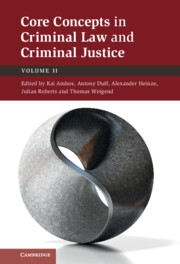Book contents
- Core Concepts in Criminal Law and Criminal Justice
- Core Concepts in Criminal Law and Criminal Justice
- Copyright page
- Contents
- About the Authors
- Abbreviations
- 1 Introduction to Volume II
- Part I Criminal Law
- Part II Criminal Procedure
- Part III Criminal Justice
- 10 The Implementation of Sentences
- 11 Collateral Consequences of Criminal Conviction in the United States and Germany
- Index
- References
11 - Collateral Consequences of Criminal Conviction in the United States and Germany
from Part III - Criminal Justice
Published online by Cambridge University Press: 24 February 2022
- Core Concepts in Criminal Law and Criminal Justice
- Core Concepts in Criminal Law and Criminal Justice
- Copyright page
- Contents
- About the Authors
- Abbreviations
- 1 Introduction to Volume II
- Part I Criminal Law
- Part II Criminal Procedure
- Part III Criminal Justice
- 10 The Implementation of Sentences
- 11 Collateral Consequences of Criminal Conviction in the United States and Germany
- Index
- References
Summary
In addition to traditional criminal sanctions, a criminal conviction can trigger a wide variety of supplementary ramifications, further burdening individuals found guilty of a criminal offence. These have become known, especially in the United States, as ‘collateral consequences’ of conviction. The label is used, in particular, to refer to those civil sanctions and disabilities – that is, not formally designated as criminal punishment – activated by a criminal conviction, but not forming part of the direct consequences of it. Examples of collateral consequences include disenfranchisement, denial of government benefits, deportation, licensing or employment restrictions in a variety of occupations, and, for certain sexual offences, registration on a sex offender registry.
- Type
- Chapter
- Information
- Core Concepts in Criminal Law and Criminal Justice , pp. 392 - 437Publisher: Cambridge University PressPrint publication year: 2022
References
- 4
- Cited by

